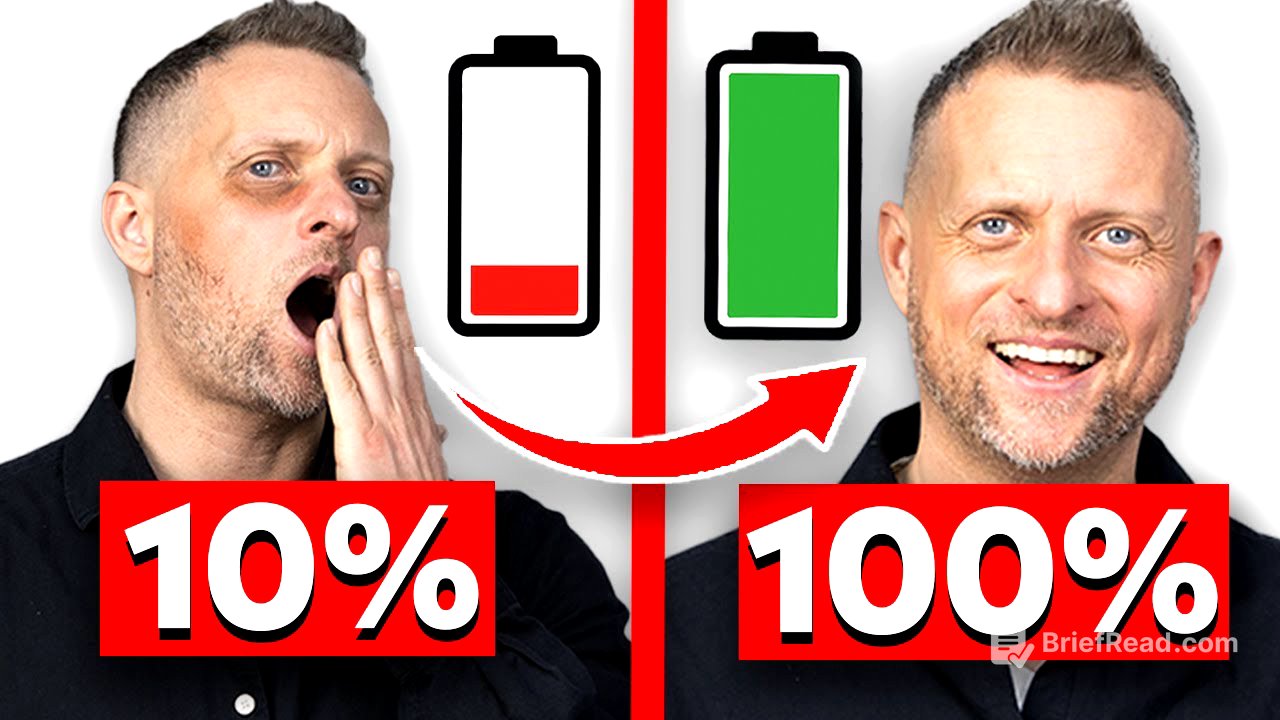TLDR;
This video outlines seven evening habits that can negatively impact sleep and overall health. It emphasizes the importance of managing stress hormones, optimizing sleep phases, and avoiding certain foods and environmental factors before bed. Key recommendations include avoiding late-night exercise, alcohol, salty foods, and blue light exposure, as well as optimizing vitamin D and magnesium intake.
- Avoid late-night exercise and alcohol consumption.
- Limit salty foods and large meals close to bedtime.
- Manage blue light exposure from screens.
- Optimize vitamin D intake in the morning and magnesium intake in the evening.
Introduction [0:00]
The video introduces seven evening habits that can unknowingly sabotage your health and sleep. It highlights how seemingly harmless decisions can disrupt the body's recovery processes. The presenter encourages viewers to consider these tips to improve their sleep and overall well-being.
Avoid Evening Exercise [0:41]
The body's stress hormone levels naturally decrease throughout the day to prepare for sleep. Exercising in the evening, regardless of intensity, can lead to a three-hour surge in cortisol, disrupting this natural decline. To avoid this, it's recommended to finish training by 7 p.m. at the latest, starting no later than 6 p.m., to allow hormone levels to decrease before bedtime.
Limit Alcohol Consumption [2:23]
Alcohol consumption before bed negatively impacts the REM (Rapid Eye Movement) sleep phase, which is crucial for cognitive and emotional regeneration. As alcohol intake increases, the duration of REM sleep decreases, and the onset of the first REM phase is delayed. It is an illusion to think that alcohol improves sleep; it merely induces sluggishness due to the neurotoxic effects of ethanol on the brain. The presenter recommends 0g of alcohol for optimal sleep.
Time Vitamin D3 Intake [3:47]
Optimal vitamin D3 levels are essential for good sleep. Studies show a correlation between low vitamin D3 levels and reduced melatonin levels, a key sleep-inducing hormone. However, taking vitamin D3 in the evening is not recommended, as it can interfere with the sleep-wake rhythm by signaling sunlight to the body when it should be preparing for sleep. Therefore, it's best to take vitamin D3 in the morning.
Reduce Salt Intake Before Bed [5:16]
Consuming salty foods in the evening can increase blood pressure and heart rate due to the sodium content, which binds water and increases blood volume. This affects hormonal control circuits and can narrow blood vessels, disrupting the inner walls of blood vessels and making them stiffer. High blood pressure correlates with longer sleep onset times. The presenter recommends low-salt options like yogurt with fruit or sprouted oat flakes for an easily digestible, sleep-friendly evening snack.
Time Your Last Meal [7:15]
The timing of your last meal significantly impacts how long it takes to fall asleep. Eating close to bedtime requires significantly longer time to fall asleep compared to not eating anything for four hours before bedtime. Studies show that not eating anything 4 hours before bedtime can help you fall asleep half an hour earlier on average. The presenter recommends having your last meal at 6 p.m. if you go to bed at 10 p.m.
Increase Magnesium Intake [8:02]
Magnesium is beneficial for sleep due to its relaxing effect on muscles and its ability to lower blood pressure. Arteries and the heart are controlled by muscles, and magnesium helps relax these muscles, which has been shown to lower both systolic and diastolic blood pressure. The presenter recommends magnesium citrate before bed, especially during summer when magnesium is depleted due to vitamin D conversion and sweating.
Minimize Blue Light Exposure [9:26]
Blue light exposure in the evening suppresses melatonin production and delays sleep onset, while also reducing sleep quality. Blue light activates intrinsic photosensitive retinal ganglion cells, inhibiting melatonin release and shifting the circadian rhythm. To reduce blue light exposure, avoid screen-protected devices for at least an hour before bed, install blue light filters on devices, or use blue light-blocking glasses in the evening. Additionally, use warm light sources with color temperatures below 3000 Kelvin and consider using candles or light bulbs instead of LEDs.
Summary [10:59]
The video concludes by summarizing the key points: avoid blue light, alcohol, late meals, intense training, and salt in the evenings. These factors disrupt melatonin production, increase stress hormones, and delay sleep onset. The presenter recommends switching to warm light, using blue light filters, finishing meals at least 4 hours before bed, training earlier in the day, and ensuring adequate magnesium intake, especially in summer, to balance hormones and improve sleep quality.









